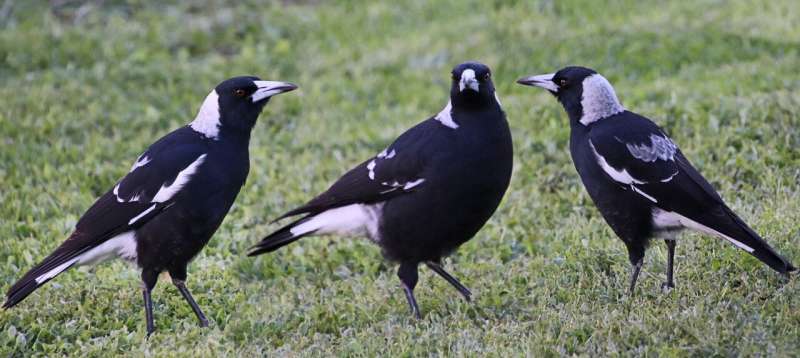This article has been reviewed according to Science X's editorial process and policies. Editors have highlighted the following attributes while ensuring the content's credibility:
fact-checked
peer-reviewed publication
trusted source
proofread
Mean magpies tend to be less intelligent, research suggests

Magpies that are aggressive towards other members of their group tend to be not so smart, according to researchers at The University of Western Australia.
Dr. Lizzie Speechley, from UWA's School of Biological Sciences, was lead author of the paper published in the Proceedings of the Royal Society B.
"Magpies live in cooperative social groups and this finding suggests being aggressive to your group members is not beneficial," Dr. Speechley said.
The study investigated the group size and individual social networks of wild Western Australian magpies, Gymnorhina tibicen dorsalis, and found the dynamics of the community may drive intellectual evolution and development.
Researchers quantified social connectedness using four types of interaction: proximity, affiliative, agonistic and vocal.
"Group size is often used as a measure of social complexity, but this may not capture the variation in dynamics of social interactions within that group," Dr. Speechley said.
The study looked at 18 groups of magpies (80–120 individuals) and how social interaction influenced their ability to collect, retain and use information from their environment to guide their behavior.
The magpies' intelligence was tested by a wooden grid with color-coded lids that swiveled when pecked. If the correct lid was pecked, the magpie received a food reward.
"Consistent with previous research on this species, we found individuals in larger groups performed better on associative learning tasks," Dr. Speechley said.
"However, the magpies' position in the social network also influenced their performance with individuals on the receiving end of aggression performing better, while those involved in aggressive interactions performed worse."
The findings support the 'necessity drives innovation' hypothesis, which suggests individuals will invest more time in finding solutions to new problems if they are unable to monopolize resources through, for example, aggression.
More information: Elizabeth M. Speechley et al, Aggressive interactions influence cognitive performance in Western Australian magpies, Proceedings of the Royal Society B: Biological Sciences (2024). DOI: 10.1098/rspb.2024.0435
Journal information: Proceedings of the Royal Society B
Provided by University of Western Australia



















